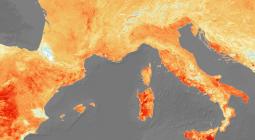We Just Experienced the Hottest June on Record and It's Part of a Larger, Troubling Trend.
At a Glance
- Four separate analyses, including from NOAA and NASA, found Earth's warmest June on record was in 2019.
- Earth is on track for one of its warmest years dating to 1880 based on trends from the first six months of 2019.
- Among areas most above average in June were Europe, Siberia, Arctic Canada and Alaska.
- This was despite a relatively mild June in parts of the U.S.
That may not sound impressive, but in the realm of global temperatures, this warm anomaly made it the planet's warmest June in records dating to 1880, slightly outpacing the previous record from 2016.
Ultimately, what's most important is not whether a given month is a fraction of a degree warmer or colder; rather, it's the overall trend, which continues its upward climb since the late 1970s.
June 2019 marked the 414th consecutive month and 43rd straight June that global temperatures have been above average in NOAA's database. NOAA noted nine of the 10 warmest Junes have occurred this decade.
It was also the 16th straight month landing in the top five warmest respective month in NASA's database, a streak that began in March 2018.
Since 2015, 50 of the last 54 months have at least tied a top five warmest respective month, according to NASA-GISS. From June 2015 through August 2016, 11 separate months set warm records for the month.
Other expert analyses came to the same conclusion.
NASA's Goddard Institute for Space Studies also found June 2019 global average temperatures across all land and ocean surfaces were warmest of any previous June in their records also dating to 1880.
A second analysis from the Japan Meteorological Agency also found June 2019 was the globe's warmest June, nudging it above both 2016 and 2015. The JMA analysis found the planet's five warmest Junes have all been within the past five years.
Earlier in the month, Europe's Copernicus Climate Change Service (C3S) also found June to have topped their previous record warm June in 2016.
Boosted by a late-month heat wave that shattered June records in eight countries and set a new all-time record in France, Europe June temperatures crushed their previous record warm June in 1999 by almost 1 degree Celsius, C3S reported.
Berkeley Earth lead scientist Robert Rohde estimated 41 countries may have set their record warmest June, including Bangladesh, Hungary, Iraq, Nicaragua, the Philippines and Turkey.
Some of the most impressive temperature departures from average in June were analyzed by NOAA over northern Siberia, over 7 degrees Celsius above average.
Europe's Copernicus Earth Observation Programme observed what they said wasunprecedented wildfire activity north of the Arctic Circle from June into early July, emitting an estimated 50 megatons of carbon dioxide.
* clik here to watch the video inside the picture
By contrast, June was relatively average in most of the Lower 48 states.
2019: Warmest Year?
NOAA's report said 2019 was tied for the second warmest first half of any year with 2017, behind only 2016.
Parts of Alaska, northwest Canada, Mexico, South America, southern Africa, eastern Asia, Australia and New Zealand were among the record warm areas over the first half of 2019, according to NOAA.
Given each month this year has been at least the fourth warmest respective month, what are the odds 2019 will end up as the hottest year on record?
NASA-GISS director Gavin Schmidt tweeted it's a near certainty 2019 will be among the top five warmest years, and likely it will be warmer than last year, with a small chance it could surpass 2016.
Berkeley Earth's Robert Rohde tweeted the chance 2019 will finish runner-up to 2016 is over 70%.
In his monthly update, climate scientist James Hansen said 2019 will probably finish second to 2016, due to a fading El Niño.
A record-tying strong El Niño lasted through roughly the first half of 2016, giving a boost to global temperatures. Hansen noted the impact on the planet's temperatures typically lags changes in El Niño by 4.5 months.
*Watch the video here.
19 July 2019
THE WEATHER CHANNEL




